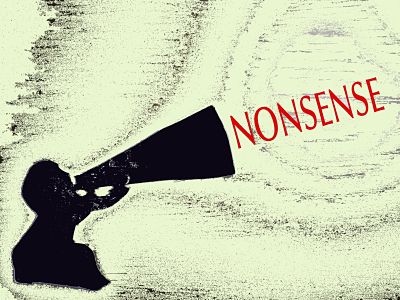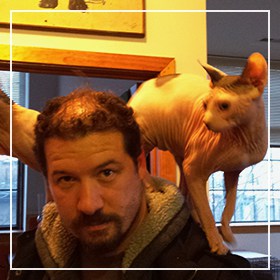It’s taken me a while to mentally unpack my experiences from the 2013 AAA conference. The conference itself came at a strange time for me, fresh on the heels of the loss of two close family members and the acquisition of two new jobs.
I bounced from session to session, cursed the Hilton’s Wi-Fi, delivered a workshop, periodically stepped out for work-related phone calls, sat on a panel or two, and indulged in Chicago’s culinary offerings. I collected business cards and passed business cards out. I reconnected with some old acquaintances, made a few new friends, and took copious notes while trying to make sense of a sprawling and diverse agglomeration of oblique specialties and deep knowledge.
Strange oppositions were the order of the day, and the most striking of them was my experience of strolling out of a panel on the importance of public engagement only to overhear a fresh-faced PhD student chirp “Marshal Sahlins is about to beat the crap out of Bruno Latour” while scampering past me on his way to a panel on “the ontological turn”
Now, I’ve had a fondness for ontological self-indulgence since the early 1990s, but all I could think about was the room I had just left full of deer-in-headlights PhD students all wondering where and how they were going to find jobs. The older faculty members on the panel had offered little consolation – they made it clear that failure to secure a full-time academic job wasn’t really a failure anymore, since the full-time academic jobs were vanishing anyway from the US job market and worldwide.
The students and recent PhD graduates did not appear to be particularly reassured by that conciliatory remark. Being told, “you didn’t fail, the system failed you” is cold comfort when you’re in your late 30s, $85,000 in debt, and living in your parents’ basement with no long-term prospects.
There were hundreds of anthropology PhD’s awarded in the US alone in 2013, and only a couple dozen faculty positions for those new graduates to fight over, not to mention the hundreds of newly graduated PhDs from 2012 who didn’t get a position that year…and the hundreds from 2011 that didn’t get a full-time position the year before that…and the hundreds from 2010 that didn’t get a full-time position the year before that year…and well… I’m sure you all get the picture.
And so I rankled at the thought of the Sahlins/Latour showdown. Not the debate itself, but that the debate was the big rockstar event of the conference. Everyone was excited for a rehashed conversation about the infinitely recursive love child of Gödel’s incompleteness theorem and the emic/etic distinction.
The fact that the ontological chatter still hasn’t died down has kept me thinking about how the public perceives anthropology – it seems like it’s all Jared Diamond, the Paleo diet, and a store that sells women’s apparel and housewares. Do you want instant depression? Walk into a bookstore (if you can find one) and go to the “anthropology” section.
Two years ago I stopped describing myself as an anthropologist on my resume – not because I’m ashamed of my anthropological training, but simply because no one outside of the discipline has any idea what the hell anthropologists do or why anyone would hire them to do anything other than teach anthropology.
Which raises a good question: aside from refusing to participate in the Human Terrain Project, what exactly is it that anthropologists do in the public eye?
We are in the midst of the cultural equivalent of the Precambrian explosion, and as a discipline anthropology is uniquely equipped to provide keys for understanding and contextualizing the ongoing societal transformations regarding same-sex marriage, supernumerary genders, public and private presentations of self, longer lives, the intersections of race and poverty, debt, the dramatic ways in which technology has changed our communication, and so much more.
If somebody asked you, “what’s the hot topic in the field of anthropology right now?” would you be eager to tell them about the ben-wa glass bead game that is the ontological turn?
Do you have an elevator speech ready for when someone impugns the relevance and utility of anthropological knowledge?
When people question why you became an anthropologist does your answer hinge on the word “interesting” or the word “relevant”?
50 years ago, E. E. Evans-Pritchard said that anthropology had to choose between being a discipline rooted in history and being nothing. Today the stakes are even higher – anthropology faces the choice of being a discipline rooted in relevance, or being nothing.
35 years ago, William Beeman outlined the foundations of a solid and reliable mode of public engagement in the pages of Anthropology Today; a clarion call that he repeats every year in the Middle East Anthropology section meetings at the AAA. In a recent email exchange he provided five additional suggestions for anthropologists interested in writing op-eds (his comments are relevant for blogs and online comments as well).
- Letters must be very short – 150 words is a safe limit
- Have a specific news peg, and refer to a specific article or ongoing issue
- Write the letter almost immediately after an article appears
- Address either an error/erroneous idea in the article or add a dimension or fact to the original article that was not covered in it
- There needs to be something of substance and novelty in the letter, though in smaller papers editors are somewhat more lax.
The more the public hears from anthropologists and the more insightful and pertinent the knowledge supplied by anthropologists, the better situated the discipline will be in the public eye. Without a clear public understanding of anthropology’s utility, there will be no change in the nonacademic job possibilities for the hundreds of newly-graduated anthropologists who have already been failed by the academic job market.






“Which raises a good question: aside from refusing to participate in the Human Terrain Project, what exactly is it that anthropologists do in the public eye?”
Your comments seem to be addressed mainly to cultural anthropologists, but there are other kinds of anthropologists, some of whom are very much in the public eye, at least within their realms of expertise. Just two examples, myself for normalizing breastfeeding beyond early childhood and James McKenna for normalizing cosleeping. I can think of other examples as well.
Katherine,
I am, of course, painting with a rather broad brush in this post. The two examples that you cited (your work and McKenna’s) are wonderful examples of exactly what I was trying to get at in the paragraph following my snarky quip about the Human Terrain Project.
I recently came across this resource and wondered why more anthropologists are not participating in the Scholars Strategy Network.
http://www.scholarsstrategynetwork.org/
Anthropologists have much insight to add to the policy fields they address – economy, health care, democracy, education, to name a few. Their roster of scholars currently includes only 3 anthropologists; it is dominated by sociologists, political scientists, and economists. Judging from their guide to membership, it looks as though they offer support in presenting information to press, public officials, and civil society forums, and help connect scholars with writing and speaking opportunities.
Anthropology will never be relevant to anyone so long as professional meetings are centered on “the French Ontological Turn”, and not on empirical ethnographic data.
Or to put it differently
The band is playing while the Titanic is sinking.